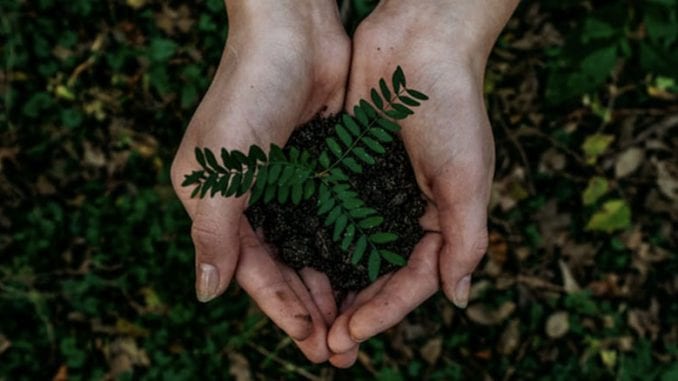
Check out the extra measures these eco-friendly cafés are taking to be sustainable.
BY JASON HUFFNAGLE
SPECIAL TO BARISTA MAGAZINE ONLINE
Cover photo by Noah Buschman for Unsplash
In 2019, the coffee industry saw significant moves toward greater environmental sustainability, with different cafés conceptualizing and putting into action their own set of green values; for example, some eliminated straws or only used compostable packaging. We here at Barista Magazine have been covering the eco-conscious movement, and the latest issue covers some common myths about compostable and reusable cups, which you can read here.
Eco-minded efforts are especially impactful today, as consumers are increasingly willing to adapt to a shop’s sustainability program. “When a café commits to environmental sustainability, it sends powerful signals to its customers about the values of the business and the kind of community it seeks to foster,” says Kim Elena Ionescu, chief sustainability and knowledge development officer at the Specialty Coffee Association. “A café’s decision to eliminate disposable cups may not contribute directly to solving coffee’s global-scale challenges, but it has a direct effect on consumer behavior, and that behavior change opens doors to new ways of thinking.”
Below are shops—some with long-standing sustainability programs—whose work is helping to move the industry forward as it becomes increasingly eco-conscious.
10 Speed Coffee
Going green is not always a walk in the park; it often takes persistence and some creative problem solving. This is something Allie Altman, store manager at 10 Speed Coffee in Santa Monica, Calif., discovered when exploring her options for composting. It took her months of looking for the right option before she found a viable solution that could keep pace with the shop’s organics volume and worked for both her building manager, while also making composting easier for her employees.
Bar Nine
Culver City, Calif.’s Bar Nine has been powered completely by solar energy since 2017. They have been running a container deposit system since 2013, in which customers are given 12-ounce glass jar—at no extra cost to the guest—with the request that they return the jar on their next visit, and providing incentives when they do. Bar Nine also requires that all their takeaway packaging for food or pastries is compostable or biodegradable.
Blue Bottle Coffee
Earlier this month, Oakland, Calif.-based Blue Bottle Coffee announced they would be waste-free by the end of 2020, as their “zero-single-use-cup” program will be first tested in the San Francisco Bay Area. By their own estimates this will have massive impact, keeping 12 million cups out of landfills annually. You can read about the announcement here.
Cajé Coffee Roasters
Cajé in Santa Barbara, Calif., has implemented a zero-waste program as well. Their bring-your-own-cup model requires customers who want coffee to-go to come to the shop with their own coffee vessel in hand. “Part of the challenge with this,” says store manager Jacob Mabee, “is the number of tourists we serve. Sometimes they don’t get it.” Cajé has a practical solution to this, though—a deposit system. Customers pay an extra $5 for a reusable container but can get their money back when they return it, which helps them stay true to their values.
Nossa Familia
The Portland, Ore.-based coffee roaster Nossa Familia takes several measures when it comes to sustainability. In addition to working with low-emission Loring roasters and securing B Corp status, one of their café locations in the Seven Corners Collaborative, a hub of nonprofits, separates waste itself between recycling, compost, and landfill, keeping these bins behind the counter. All Nossa cafés charge an extra 25 cents for to-go cups, and simultaneously discount 25 cents for any takeaway cups brought into their spaces. Nossa Familia also sells lots of reusable café items like straws and cups, and opts for glass and dishware when hosting events.
Colectivo Coffee
Colectivo Coffee takes similar initiatives as Nossa Familia to be as green as they possibly can in their several cafés in the Midwest. The cafés run on efficient HVAC systems that conserve natural gas, along with carrying paper straws and to-go containers. Plastic utensils and drink stoppers are only available by request, and they also knock off 25 cents for every reusable travel mug brought into their shops. The list of eco-friendly activities continues, which you can read about here.

ABOUT THE AUTHOR
Jason Huffnagle is a freelance writer for Barista Magazine who has worked in coffee as a barista for six years. Having left his “adult job” in the U.S. Senate, the Alaska native spent several months traveling throughout Europe. You can read about his coffee-fueled travels and other exploits by following him @jasonhuffnagle on Twitter.

